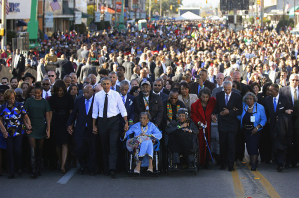
The event known as "Bloody Sunday" that happened in the small Alabama town of Selma 50 years ago was one of the pivotal moments of the 1960s civil rights movement that brought change at a national level. However, it also highlighted the issue of deep poverty in that town and many places across the United States.
According to Aamer Madhani of USA Today, Selma, a community of 20,000 people that helped usher in the Voting Rights Act of 1965, has an unemployment rate of 10.2 percent; the national rate currently stands at 5.5 percent. In addition, Selma is the county seat of Dallas County, which was considered the poorest in Alabama last year.
"Selma sowed, but it did not reap," James Perkins Jr., who became the city's first African-American mayor in 2000, said. "Many of the benefits that went to other places in the South and around the world since the Voting Act of 1965 did not come to Selma."
Madhani reported that more than 40 percent of families and 67 percent of children in Dallas County lived below the poverty line. In addition to violent crime being five times the state average, one Alabama newspaper termed the region "Alabama's Third World."
"I hope this 50th anniversary will help Selma begin reaping some of those benefits," Perkins said.
Thousands of people came to Selma to commemorate the marches in Selma, including President Barack Obama and his family. He made a speech about the events of that fateful day 50 years ago; his entire speech was published by Bloomberg.
"As is true across the landscape of American history, we cannot examine this moment in isolation," the president said. "The march on Selma was part of a broader campaign that spanned generations; the leaders that day part of a long line of heroes."
Obama noted that the men and women who marched at Selma had faith both in God and America.
"The Americans who crossed this bridge were not physically imposing, but they gave courage to millions," Obama said. "They held no elected office, but they led a nation. They marched as Americans who had endured hundreds of years of brutal violence, and countless daily indignities - but they didn't seek special treatment, just the equal treatment promised to them almost a century before."
Obama contended that "poverty and the roadblocks to opportunity" can be rolled back across the United States, even in Selma, Ala.
"Americans don't accept a free ride for anyone, nor do we believe in equality of outcomes," Obama said. "But we do expect equal opportunity, and if we really mean it, if we're willing to sacrifice for it, then we can make sure every child gets an education suitable to this new century, one that expands imaginations and lifts their sights and gives them skills."
The president added that it was up to everyone to "make sure every person willing to work has the dignity of a job, and a fair wage, and a real voice, and sturdier rungs on that ladder into the middle class."
However, bringing that economic prosperity to Selma may be easier said than done. Madhani elaborated on how the small Alabama town took a huge economic hit shortly after 1965.
"Craig Air Force Base, which hosted undergraduate pilot training, was closed in 1977," Madhani wrote. "The base housed about 2,500 people and contributed millions of dollars to the local economy."
Madhani added that the phenomenon of "white flight" took place after 1965, noting that over the past three decades, more than 10,000 white residents left Selma, which left the town 80 percent African-American.
"It feels like nothing new has come here in decades," 65-year-old Hubbert Fitzpatrick, who grew up in the area but now lives in Houston, said. "It's a little bit sad."
Not everyone decided to commemorate the historic events at Selma. Historian David Garrow told USA Today that he skipped the events because Selma became "a symbolic holiday for celebrities" instead of turning the focus on achieving the goals of the original 1965 campaign, which included fighting poverty.
"The focus should be on investment and economic development in places like Selma," Garrow said. "The focus should be on what we can do for Selma, not what Selma can do for us."
Garrow argued that the celebrations in Selma had the effect of "reducing history to a photo opp."
Despite the criticism surrounding the 50th anniversary event, the president contended that "our march is not yet finished."
"Two hundred and thirty-nine years after this nation's founding, our union is not yet perfect," Obama said. "But we are getting closer. Our job's easier because somebody already got us through that first mile."







